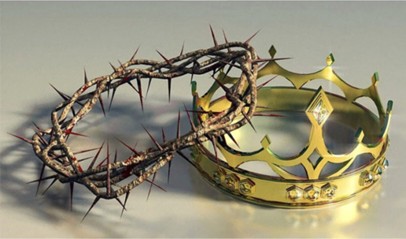
Do you believe in miracles? Do you believe in the supernatural? What about divine intervention? Or a better question might be, have you seen God working in your life? Do others see God working in your life?
My brother was working in the greenhouse when a customer walked in and marveled at the beauty of all the plants. He then exclaimed how impressed he was at all our hard work. My brother responded with, “Some plant, some water, but God gives the increase.” To which the customer responded with, “No, no, don’t give the credit to God. You came out here and did all this work. You planted, watered, and fertilized all these plants, and you all deserve the credit, not God!” The reason the man felt this way is because he was a humanist.
The dictionary defines humanism like this; an outlook or system of thought attaching prime importance to human rather than divine or supernatural matters. Humanist beliefs stress the potential value and goodness of human beings, emphasize common human needs, and seek solely rational ways of solving human problems.
If God does exist, then we will have to recognize this fact and answer to Him. Humanists attempt to prove that God does not exist, so they can freely live their lives as they please. According to humanism, there is no God. If so, then we, the human race, are superior to God. Everything is for us and our ultimate happiness. This is the definition of humanism.
There are two types of humanistic beliefs, and we will look at both. The first belief is the theory that there is no God. In reality, this seems to be the only rational way to be a humanist. Everything is created by man and for man. There are no other factors or supernatural involvement. Everything happens by reason and common sense. There is a logical explanation for everything that happens. Of course, some things do not make sense, but humanists brush those aside and look only at the things that can be explained. Like the plants in the greenhouse, they look at all that man does and ignore the supernatural part of a plant springing forth with new life. Scientists around the world are working diligently to put human reasoning into everything that has ever happened, even the creation of the world. Scientists, with all their learning and wisdom, attempt to give logical explanations for why natural disasters and global crises happen. If they can explain everything, then they can rule out God and His existence. This allows the human race to do as it pleases without eternal consequences. This, in turn leads to a great sense of false peace.
The humanists, with all their reasoning, mock the very existence of God. If you go to most colleges in America and talk to people about Christianity, they laugh at you and mock the fact that Christians actually believe in God.
The second type of humanistic belief is a theory of humanism that acknowledges the existence of God. One anthropologist argued that humanism is a project of modernity and a secularized continuation of Western Christian theology. But if you ask people what they think humanism means, you will likely get different responses, and it becomes very confusing. But why the confusion? Because people are trying to be Christian humanists. Christian Humanism has frequently been criticized for its vagueness and difficulty to define. The reason it has become so confusing is that people want to believe in God but also believe in themselves and that the world revolves around them.
In Romans, we read, “For the wrath of God is revealed from heaven against all ungodliness and unrighteousness of men, who hold the truth in unrighteousness; Because that which may be known of God is manifest in them; for God hath shewed it unto them. For the invisible things of him from the creation of the world are clearly seen, being understood by the things that are made, even his eternal power and Godhead; so that they are without excuse: Because that, when they knew God, they glorified him not as God, neither were thankful; but became vain in their imaginations, and their foolish heart was darkened. Professing themselves to be wise, they became fools, And changed the glory of the uncorruptible God into an image made like to corruptible man, and to birds, and fourfooted beasts, and creeping things. Wherefore God also gave them up to uncleanness through the lusts of their own hearts, to dishonour their own bodies between themselves: Who changed the truth of God into a lie, and worshipped and served the creature more than the Creator, who is blessed for ever. Amen. For this cause God gave them up unto vile affections: for even their women did change the natural use into that which is against nature: And likewise also the men, leaving the natural use of the woman, burned in their lust one toward another; men with men working that which is unseemly, and receiving in themselves that recompence of their error which was meet. And even as they did not like to retain God in their knowledge, God gave them over to a reprobate mind, to do those things which are not convenient; Being filled with all unrighteousness, fornication, wickedness, covetousness, maliciousness; full of envy, murder, debate, deceit, malignity; whisperers, Backbiters, haters of God, despiteful, proud, boasters, inventors of evil things, disobedient to parents, Without understanding, covenantbreakers, without natural affection, implacable, unmerciful: Who knowing the judgment of God, that they which commit such things are worthy of death, not only do the same, but have pleasure in them that do them” (Romans 1:18-32).
So how can one be a humanist and believe in God? This is where we hit a little closer to home. This type of humanist believes God wants him to be happy. He believes in a Creator God but does not believe he has to serve Him In reality. He doesn’t believe in the true God but, in his mind, created a fictitious god that does not exist. This allows him to live for himself and his own happiness. This type of person will talk about God, go to church, sing songs, and say prayers. However, he will look only to man for all his needs. If he is sick, he calls a doctor. If he needs money, he goes to the banker. If the need is a break from reality, he takes a vacation or retreat. He lives life for his own happiness and then thanks God though he did not look to God for his needs. These people are dependent on themselves. They have confidence in themselves.
Here is an example: A Christian plants a garden and takes care of it each day. He waters and fertilizes weeds and prunes. Finally, his plants all begin to bear fruit, nice fruit. He thanks God for the plentiful harvest. His neighbor, an atheistic humanist, also planted a garden. He, too, went out each day and watered, pruned, weeded, and fertilized. He also received a bountiful harvest. This man, however, boasted of all that he had accomplished. Both men did the same things and had similar results. One gave God the credit, and one credited himself. He will say he accomplished the same thing without God that his neighbor did with God. Christians know that he is wrong and that he actually did need God to grow his garden.
When something happens that requires supernatural intervention, the Christian humanist prays and asks others to pray. However, he does not believe God will answer their prayers and instantly gets to work to solve his problem, with only human reasoning. Then, if the problem is resolved, he thanks God for it. This type of humanism has confused the modern world. It has caused unbelievers to mock the Christian faith and to call it a false religion with no power.
The Christian does not believe in human reasoning. The Christian believes that the God of heaven is the reason for everything. “For by him were all things created, that are in heaven, and that are in earth, visible and invisible, whether they be thrones, or dominions, or principalities, or powers: all things were created by him, and for him” (Colossians 1:16). We are nothing without Him, and without Him, we can do nothing. Christianity is the opposite of humanism. When the Christian does something supernatural, something the humanist or atheist cannot do, then we have something that will confound the wise.
When the neighbor sees the Christian loving his enemies, forgiving someone who wronged him, and doing things that he cannot do, he then begins to wonder where the power to do these things came from. This then leads him to the Father. When there is nothing supernatural that we are doing, he is confused.
I fear that we are falling into this trap of ‘Christian Humanism.’ We talk the talk; we say we believe in God. We go to church, sing songs, and say prayers. However, from outward appearances, we trust in ourselves. Because we have centered our lives around ourselves and our well-being, the God of heaven does not hear us. Our prayers are not answered, and the time on our knees is a struggle at best. We go through the motions because that is how we’ve been taught, but our faith lies in human reasoning.
It can be extremely difficult to seek the Lord while living in a humanistic society. A society that has perfected the pursuit of liberty and happiness. Slowly, the church is caving to the ways of this world.
A minister from China was visiting the churches in America. Before departing back to China, he was asked what impressed him most about the churches in America. He replied, “I am amazed at what all they have accomplished without God.”
We would do well to simplify the modern definition of humanism. The humanist proudly denies that there is a God when he boasts of his own strength and abilities. He proclaims the great accomplishments of man and mocks the humble Christian.
The Christian denies himself, picks up his cross, and follows his Master. The Christian thinks nothing of himself or the ability of man, confidently admitting that he is merely dust and back to that dust he will quickly go. The Christian looks for the good in others and trusts God for all his daily needs and cares.
Christians believe they are merely servants to their master. They are hated by the world and despised by most, rejected. “If the world hate you, ye know that it hated me before it hated you. (John 15:18)” To them, this life is not the pursuit of happiness. The things of this world do not even interest them. Their joy and peace comes solely from serving their master, from pleasing their Heavenly Father. To the world, they are strange. Fools. To God, they are His dear children.
God is still looking for people today who will put their trust in Him. He is looking over all the earth for someone, somewhere, who will put aside human reasoning and common sense and obey the voice from heaven. God wants men with faith who will step out into the supernatural, like Abraham, Moses, David, and the thousands of believers that followed. Someone who will deny himself and this world and follow the Savior.
When this life is over, the humanists, whether they say they believe in God or not, will perish. And the Christians will go on to live forever in glory.
Humanist? Christian? Christian Humanist? Which one are you?







